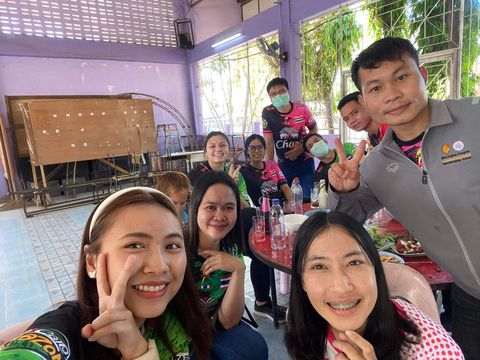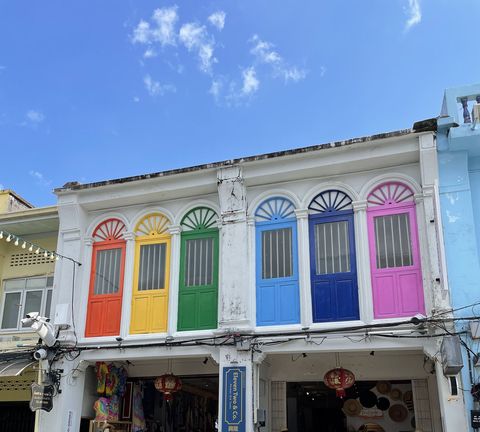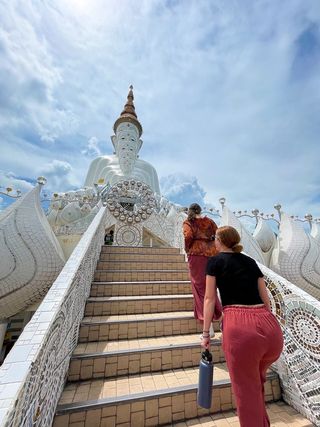
FAQs - Teach in Thailand
Topics on This Page:
Application Process | Job Placement | Living and Working | Travel and Arrival
Application Process
We have hundreds of job opportunities available in Thailand each year. As long as you meet the program eligibility requirements and apply on time, you will most likely be accepted. We have an excellent track record with placing teachers and are typically able to find jobs for everyone!
TEFL certification is highly recommended, but not a requirement for our Thailand programs. Thai schools prefer teachers to be TEFL certified and having the certification makes you a stronger applicant as well as increases your monthly salary to 30,000 THB per month. Thai schools are very welcoming and supportive toward foreign teachers, but cannot offer teacher training. It’s normal to have multiple classes with 30-50 students which can be challenging for first-time teachers, and the course is a great way to prepare yourself and boost your confidence. Our 150 hour online TEFL certificate is recognized worldwide, accredited, and valid for life. You can add it to your online application at any time using the “Add TEFL” button. The course has an additional fee of $1,000.
Yes! If you haven’t graduated yet, please submit a note from either your Academic Advisor or Registrar to confirm your anticipated graduation date and degree type. You can upload this to your Educational Documents section in place of your diploma and transcripts.
If you want to teach in Thailand in the spring immediately after a spring graduation, you must contact the program coordinator for special instructions. You will be assigned to a June departure, to allow extra time to prepare your graduation confirmation documents for your Thai visa.
Job Placement

We work with a trusted Thai partner organization called OEG to facilitate the process of meeting with schools in Thailand and sharing your application with them. CIEE and OEG use your placement preferences to meet your needs and match you up with the best possible fit. We do not make final hiring decisions – that’s up to the individual schools, and they make those decisions based on their own criteria and needs. Once you are matched with a school, you will be notified and given the details of your placement by email.
Most of CIEE’s partner schools are located in central, eastern, or northeastern Thailand, including many within a few hours of Bangkok. Schools are normally located in large towns or small cities. A small number of placements are available in the cities of Bangkok and Chiang Mai as well as the southern coastal areas such as Phuket and Krabi, so it is less likely that we can honor requests for these competitive areas. We do not place teachers in Narathiwat, Pattani, Yala, Satun, or Songkhla.
On our application, you can rank your placement preferences, including a preferred region. We encourage you to keep an open mind about location. Most of our placements are in towns that are not major tourist attractions, so there won’t be much information about them online. That’s OK! CIEE and OEG can help you learn more about the area once you are placed.
We get this question a lot: Can couples teach in Thailand together? Can friends teach in Thailand together? The answer is, yes! It’s pretty easy to find a Thai school that will hire both of you, and give you shared housing. Make sure to mention each other’s names in your placement preferences and to apply at the same time. Keep in mind that you may need to be flexible about other considerations (location, age group) in order to be placed together.
Yes! Teaching in a foreign country is fun and rewarding, but it can also be intimidating. If it would be helpful for you, it’s easy for us to place you at a school alongside other CIEE teachers, and you can request this on the placement preferences section of our online application. If that’s your top priority, you may need to be flexible about your other placement preferences, like location or age group.
Yes! As long as your teaching performance is satisfactory, schools are normally eager to renew or extend your contract. If you’re on the fence between signing up for one or two semesters at first, we encourage you to choose two. That way, you won’t have to go through the renewal paperwork in Thailand.
Living and Working in Thailand
The short answer is, yes! The salary in Thailand might not look like much, but rent-free housing is provided and you will earn 2-3 times the salary of your Thai colleagues. If you’re living like a local, other costs of living are vastly lower than in the US.This means that you can take care of meals, groceries, utilities, internet, cell phone, and local transportation, and still have money left over each month. You can use it to plan amazing trips, make student loan payments, or just save it up and bring it back with you!

In addition to the monthly salary, all of our partner schools will arrange safe, comfortable housing for teachers. Whether the school pays your landlord for you, or pays you an extra housing stipend, the cost of rent does not come out of your regular salary. You will be responsible for the cost of utilities, typically USD $15-25 per month.
Accommodations will vary a bit from school to school, and you will receive more details when you are placed at a specific employer. Accommodations could be a shared house, studio or one-bedroom apartment. If there are other CIEE teachers at your school, you may share a unit with flatmates, but you will have your own bedroom. Thai kitchens are very basic since Thai families eat out for most meals. Housing comes with basic furnishings (bed, mattress, table, hot plate), and you can make the space your own with inexpensive local shopping.
In the classroom, you will be the lead teacher. Working hours will vary slightly from school to school, but a typical assignment will have you in the classroom for 20-25 classroom hours per week, Monday-Friday. This amount of time does not include class planning, faculty meetings, school events, grading, or extracurricular activities. Including those activities, you can expect a full-time, 35-40 hour workweek.
The curriculum you will need to follow varies greatly from school to school. Some schools have a structured curriculum while others have general teaching outcomes for the semester. You will learn more about the expectations and resources your school has once you are placed at a school.
Since you can’t know these exact details in advance, it’s a good idea to be prepared for anything. Start gathering lesson ideas online, talk to friends who are teachers, and consider taking CIEE’s online TEFL training course. It’s a great way to get yourself ready!
Thailand operates on a two-semester education system. The first semester is from early-May through late-September. The second semester begins in mid-October and runs through late-March of the following year. Your school expects you to attend orientation before you start teaching, even if it means that you miss the first few days of the semester. There are a few schools that run on a western or three-trimester calendar, but these are the exception, not the norm, and typically hire professional teachers starting in early August.
Once you arrive at your school, your coordinator there will help you set up a local bank account. Most teachers are paid by direct deposit, cash, or check. You can continue to use your U.S. bank or credit cards abroad, but you will need to contact your home financial institution to discuss fees, travel alerts, and security.
Although famous as a beach vacation destination, Thailand is actually a pretty conservative place, and this carries over into expectations for teacher attire. Some schools provide teachers with a uniform shirt, but most schools simply require business casual attire. Women must cover their shoulders in the classroom and wear slacks or skirts knee length or longer. Slacks may not be permitted for women, so check with your school once you are placed. Men should wear slacks or dress pants with a button-up or polo shirt and dress shoes. Some schools require ties for men, so be sure to pack some. Tattoos should be covered while teaching and non-ear piercings may need to be taken out or covered. Thailand’s climate is very hot, so make sure your clothing is light and breathable.
At CIEE, we use our international connections and resources to monitor safety and security in all of our destinations, relying on public and non-public information sources. We are confident that Thailand is a safe country in which to live and teach. No place is completely risk-free, whether at home or abroad, and it’s important to follow common sense practices, such as not walking alone after dark, keeping your passport in a safe place, and not driving motorbikes. We also recommend drinking bottled water instead of local tap water as well as being vigilant when eating street food.
As part of our orientation, we discuss detailed advice for how to stay safe and healthy. In addition, you’ll receive several layers of 24/7 emergency support, from school coordinators, CIEE and OEG staff, and iNext international travel and emergency insurance (for US citizens). For more information about safety in Thailand, please consult the State Department’s country page, and consider enrolling in the STEP program, which can be helpful for concerned family members as well!
Travel and Arrival
Getting a work visa is more complicated than a tourist visa, so CIEE will guide you through the process. Expect detailed written instructions for how to prepare documents and submit applications, and our US-based staff is available to assist with your questions.
NOTE: You won’t be able to apply for your visa until after you receive your placement, so be sure to wait for instructions!
You must wait for these two things to happen before you can buy a flight: 1) placement at a Thai school, and 2) CIEE’s announcement (by email) of the exact orientation dates, about 2 months in advance. In addition, we strongly recommend waiting to buy tickets until you receive your visa, to protect yourself from airline change fees in the unlikely event that your visa isn’t ready on time.
We encourage you to follow the recommendations of the Centers for Disease Control and Prevention (CDC) and your doctor. Plan ahead, since some multi-injection vaccine courses take 4-6 weeks to complete. If you find vaccines to be too expensive in your home country, you can often obtain them in Thailand after your arrival. Discuss your options with your doctor to determine what is best for you.
Transportation will be provided from the airport to the orientation hotel as long as you arrive within the suggested arrival time, announced after you confirm your teaching placement. Your hiring school will arrange for your transportation from orientation to your teaching site, so you don’t need to worry about these logistics!

CIEE organizes a multi-day teacher orientation in Bangkok or Chiang Mai with our partner organization OEG. You’ll get to meet fellow CIEE teachers, learn about Thai culture and traditions as well as participate in Thai language lessons and sightseeing excursions. You will also have the opportunity to meet with experienced teachers to practice lesson planning and teaching. Orientation is included in your program fee and attendance is mandatory.
Taxis, including tuk tuks and motorbike taxis, are cheap and easy to find throughout the country. Make sure to ask the driver to turn the meter on or negotiate for a reasonable fare ahead of time. For intercity travel, there are loads of bus companies, from shoestring budget fares to VIP buses with deluxe snacks and air conditioning. Trains and large vans also have multiple intercity routes. You can easily travel to other regions in Thailand by air; there are many domestic airports and affordable airlines to choose from. Finally, if you do choose to use a motorcycle taxi or ride a bicycle, make 110% sure to wear a helmet!

More Information
For eligibility requirements, compensation, program fees, and more, visit our Teach in Thailand Program pages.
Have More Questions? Email us!